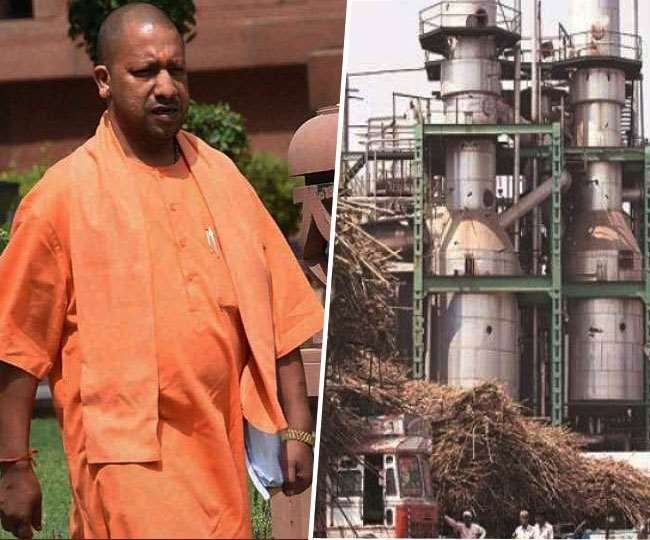Sugarcane farmers and Sugar industry are the backbone of the economy of Uttar Pradesh. In pre-2014 times, the sugar industry was suffering from a huge liquidity problem and sugarcane arrears were in excess of Rs 15000 crore, which was more than 50% of the total sugarcane payment. During 2012-2014, some of the arrears extended for more than two years as well.
In the past, most governments have pitched farmers and the industry against each other irrespective of the fact that both are rather complementary to one another. Sugar industry makes sure that they crush each and every ton of available sugarcane regardless of sugar demand and farmers also back industry for sowing newer sugarcane varieties.
With the collective efforts of farmers, industry, agricultural scientist, state and central government, the sugar industry has had a turnaround from being a vulnerable Industry to a strong cash flow generating sector. Except for a handful of sugar mills, all others have paid 100% of dues for the season. Moreover, sugarcane dues of earlier years have also been fully paid.
Newer sugarcane varieties propelled growth
The enormous efforts of agricultural scientists resulted in introduction of the magical sugarcane variety Co-0238, which changed the entire dynamics of sugarcane economics with a 40% improvement in sugarcane yields and a 20% increase in sugar recovery (extraction of sugar from sugarcane). Though the variety was available even before 2015, it only gained prominence in 2017-18 improving the farmer’s income by 40-50%, largely by productivity improvement. Given the 20% improvement in sugar recovery, cost of production for sugar mills also declined by 20%, which gave them confidence to promote new sugarcane seeds for superior output.
Active government measures revived sugar economy
Though productivity improvement enhanced income of farmers and reduced the cost of production for sugar mills, it also led to the sweeter problem of excess sugar production and significant decline in domestic sugar prices in 2018. At that time, central and state government intervened to make a long term plan to utilize the excess sugar production. The central government came up with the certain short term measure in June 2018 to bring immediate relief to the industry and farmers.
These were (1) declaration of MSP (Minimal Selling Price) for sugar (2) start of monthly quota mechanism (3) buffer subsidy (4) export incentives for sugar companies. These measures ensured stable sugar prices and cash-flows for sugar mills, which in turn helped the millers to continue their timely payment to the farmers. With more than 15 million tonnes of exports, sugar inventories came down from the peak of 14.5 million tons (60% of consumption) in September 2019 to the reasonable levels of 8.3 million tonnes in September 2021. Central government export related support has made the industry self-sufficient to the extent that it may not require buffer and export subsidy in future.
One of the landmark step, after Yogi government came to power, was asking sugar mills to compulsorily open an escrow account. Sugar mills allocate 85% of the money received from the sale of sugar to the bank account of sugarcane farmers for bill payment. It protects sugar mills to divert money for the purpose other than payment of farmers. The state government also provided interest free loans to millers in 2018-19 season for timely payment to the farmers. The aggressive promotions and programs of UP government towards drip irrigation would also ensure that water is utilized appropriately for the high water intensive crops in the state.
EBP is giving wings of growth
Many of the measures taken during 2018-2019 were for safeguarding the industry from the immediate decline in sugar prices. However, with the collaboration of state and central governments, the pace of Ethanol Blending Program (EBP) has been accelerated. OMCs would be producing ~330 crore liters in the current year, which is closer to 8.5% ethanol blending with petrol. Modi government has kept an aggressive target of 10% and 20% ethanol blending by 2022 & 2025 respectively. In this regard investment worth Rs 40,000 crore has been initiated across India. UP, being the largest sugarcane producing state, would benefit the most with the implementation of EBP.
This program would not only ensure that excess 6-7 million tonnes of sugar is diverted towards producing ethanol but it would also push the depressed sugar prices in an upward trend. Notably, sugar prices have remained around Rs 30-35 / kg since 2010. Further, as much as 16 million tonnes of excess grain would also be utilized for ethanol blending program. With the 20% ethanol blending, the government would reduce its crude import bill by Rs 38,000 crore and vehicle emission (Carbon Monoxide, Hydrocarbons) reduces by 20-40%. Hence, the program is a win-win for all stakeholders.
Given the collaborating efforts of farmers, sugar industry, agricultural scientist, State and central government, the sugar industry has come out of the shackles of gloom and doom. Sugarcane payment to UP farmers in past five years has increased to Rs 1.42 lakh crore as against Rs 0.95 lakh crore between 2012-2017. Moreover, all due payments of the previous years to the farmers has also been paid during five years of Yogi Government.
The sea change in the industry was only possible due to the government’s right intent and commitment of increasing the farmer’s income. The productivity enhancement, emergence of ethanol and increase in sugarcane prices is likely to increase the farmer’s payment to more than two lakh crore in next five years along with a profitable sugar industry, which would also contribute to the exchequer. No doubt this old economy sector has been enabled with wings of growth.
The author is an equity research analyst with fifteen years of experience in tracking consumer & Sugar Sector.





